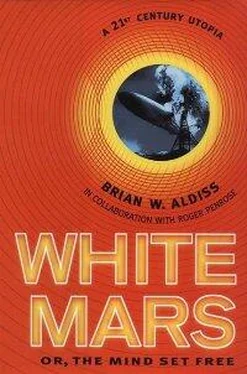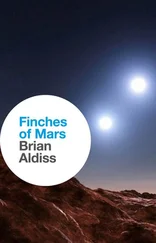Brian Aldiss - White Mars
Здесь есть возможность читать онлайн «Brian Aldiss - White Mars» весь текст электронной книги совершенно бесплатно (целиком полную версию без сокращений). В некоторых случаях можно слушать аудио, скачать через торрент в формате fb2 и присутствует краткое содержание. Год выпуска: 1999, ISBN: 1999, Издательство: Little, Brown UK, Жанр: Фантастика и фэнтези, на английском языке. Описание произведения, (предисловие) а так же отзывы посетителей доступны на портале библиотеки ЛибКат.
- Название:White Mars
- Автор:
- Издательство:Little, Brown UK
- Жанр:
- Год:1999
- ISBN:0-316-85243-0
- Рейтинг книги:5 / 5. Голосов: 1
-
Избранное:Добавить в избранное
- Отзывы:
-
Ваша оценка:
- 100
- 1
- 2
- 3
- 4
- 5
White Mars: краткое содержание, описание и аннотация
Предлагаем к чтению аннотацию, описание, краткое содержание или предисловие (зависит от того, что написал сам автор книги «White Mars»). Если вы не нашли необходимую информацию о книге — напишите в комментариях, мы постараемся отыскать её.
White Mars — читать онлайн бесплатно полную книгу (весь текст) целиком
Ниже представлен текст книги, разбитый по страницам. Система сохранения места последней прочитанной страницы, позволяет с удобством читать онлайн бесплатно книгу «White Mars», без необходимости каждый раз заново искать на чём Вы остановились. Поставьте закладку, и сможете в любой момент перейти на страницу, на которой закончили чтение.
Интервал:
Закладка:
Like everyone else, our crew had seen and been seduced by computer-generated pictures of EUPACUS-format Mars. Domes and greenhouses were laid out in neat array . Factories were set up for the task of extracting oxygen from the Martian rock. Nuclear suns blazed in the blue sky. In no time, bronzed men in T-shirts stepped forth among green fields, or climbed into bubble cars and drove furiously among Martian mountains already turning green.
Standing amid that magnificent desolation, the salesman’s dream fizzled out like a punctured balloon.
We had landed almost on the equator, in the south-western corner of Amazonis Planitia, to the west of the high Tharsis Shield. Our parent ship acted as communication relay satellite, so that we could travel and keep in touch with one another. Highly necessary on a world where the horizon—supposing the terrain to be flat, which it mostly was not—was only 25 miles away. In its areosynchronous orbit, travelling 17,065 kilometres above ground, the ship appeared stationary to us, a reassuring sight when so much was strange.
But before we began our surveying we had to erect our geodesic dome to support a one-millimetre-thick dome fabric. We had been weakened by the months of flight, despite on board exercise. This weakness turned the building of the dome into a major task, impeded as we were by our spacesuits. Night was upon us before we were half finished. We had to retreat back into the module, to wait for morning.
When morning came, out we went again, determined not to let the structure beat us. We needed the dome. It would afford protection against the deepest cold and dust storms. We could exercise here and offload into it some of the machinery that made life in the module maddeningly cramped. Of course, as yet we had no means of filling it with breathable air at a tolerable pressure, even after we made it airtight. Since the dome had to go up, up it eventually went. When the last girders were bolted together and the last tie of the plastic lining secured—why, we needed no more exercise …
Our brief was to explore a few kilometres of the planet. Its enormous land area was as great in extent as Earth’s, if not quite as various. It had plains, escarpments, riverbeds, vast canyons greater than anything terrestrial and extinct volcanoes—none of them traversed by human beings. We activated the TV cameras, and climbed aboard the two methane-powered buggies, to head eastward.
The intensity of that experience will always remain with me. While folks back home might see nothing on their screens but a kind of broken desert, that journey for us carried a strong emotional charge. It was as if we had travelled back in time, to a period before life had begun in the universe. Everything lay waiting, still, latent, piercing. None of us spoke. We were experiencing a different version of reality—a reality somehow menacing but calming. It was like being under the thunderous eye of God.
As we climbed, the regolith became less rocky. We might have been traversing the palm of an old man’s withered hand. On either side were dried gulleys, forming intricate veins, and small impact craters, evidence of the bombardment of this world from space. We stopped periodically, taking up samples of rock and soil and storing them in an outer compartment for examination later, always marking the micro-environment from which they came. Since the ground temperature was sixty degrees below, we had little expectation of finding even a micro-organism.
Our progress became slower as the slope became steeper. We were now within sight of the flanks of the massive Tharsis Shield. August, lugubrious, it dominated the way ahead. It would be the subject of a later and better equipped exploration. Once we had caught sight of the graceful dome of Olympus Mons—a volcano long extinct—we turned the vehicles about and went back to base.
For the first kilometre of the return journey, the dust we had disturbed still hung in the thin atmosphere.
The laboratory was in my charge. By sundown, I had begun to test the first rock samples. The gas chromatograph mass spectrometer gave no indication of life. Part disappointed, part relieved, I went to join the others in the canteen for supper.
We were a strangely silent group. We knew something memorable had happened in the history of mankind and wanted to digest the meaning of the occasion. Drilling equipment had been set up in the dome before our excursion. A computer beeping summoned us to judge results. Water had been discovered 1.2 kilometres below ground level. Upon analysis, it was found to be relatively pure and inert. No traces of microorganisms.
We rejoiced. With a water supply, living on Mars was now practicable. But the way lay open for terraforming.
3
Should the citizens of the United States, for example, be answerable solely to Martian law when on Mars? Eventual answer: Yes. Mars is not a colony, but an independent world.
This was the sensible legal decision that became the foundation stone for the Deed of Independence that governs our lives on Mars and will stand as exemplar for all the other worlds we inhabit in times to come.
One of the greatest achievements of the last century was the establishing of preliminary planetary surveys. Less acknowledged was a system of workable international law.
From the start, weapons were prohibited here. Smoking is necessarily prohibited, not only as a pollutant but as a needless consumer of oxygen. Only low-grade alcohols are allowed. Habit-forming drugs are unknown. An independent judicial system was soon established. Certain categories of science are encouraged. We owe everything to science.
Under these laws and the laws of nature, we have built our community.
When I think back to this early time just now, I find consolation there. My daughter, Alpha Jefferies—now Alpha Jefferies Greenway—left Mars last year to live on a planet she had never known. I fear for her on that alien globe, although she now has a contract-husband to protect her.
She told me once, when we were still in communication, that Earth is the world of life. My image of it is as a world of death—of starvation, genocides, murders, and many horrors from which our world here does not suffer.
My arguments with my dear lost daughter have caused me to look again at those first years on Mars, when there was an excitement about being on a strange world and we were not entirely free of Earth-generated myths regarding ancient life on Mars, of finding old land-locked canals leading nowhere, or great lost palaces in the deserts, or the tombs of the last Lords of Syrtis! Well, that’s all juvenile romanticism, part of the fecundity of human imagination, which sought to populate an empty world. And that is what still thrills me—this great empty world in which we live!
I will introduce myself. I am the adopted daughter of the great Tom Jefferies. I first knew life in the crowded city of Chengdu in China, where I was trained as a teacher of handicapped children. After five years of teaching in the Number Three Disability School, I felt a longing to try another planet. I applied for work on a UN work scheme and was accepted.
For my community service, I served for a year as kennel-maid at a dog-breeding station in Manchuria, where life was extremely hard. I passed the behavioural tests to become a fully fledged YEA. After all the preliminaries, including the two-week MIC—or Martian Inculcation Course—I was permitted to board the EUPACUS ship to Mars, together with two friends, on an ORT, an Opposition Return Trip.
What excitement! What dread!
Although I had anticipated that Mars itself would be bleak, I had not imagined life in the domes, which, by the time I arrived, was unexpectedly colourful. As a reminder of the semi-Oriental composition of Marvelos, the travel bureau subsidiary of EUPACUS which freighted everyone to Mars and back, brilliant lanterns were hung among the simple apartment blocks. Tank-walls of living fish stood everywhere. Flowering trees (originating from Prunus autumnalis subhirtella) were planted along avenues. And what I liked best were the genetically adapted macaws and parrots that cast a scatter of colour as they flew free, and sang with sweet voices instead of croaking.
Читать дальшеИнтервал:
Закладка:
Похожие книги на «White Mars»
Представляем Вашему вниманию похожие книги на «White Mars» списком для выбора. Мы отобрали схожую по названию и смыслу литературу в надежде предоставить читателям больше вариантов отыскать новые, интересные, ещё непрочитанные произведения.
Обсуждение, отзывы о книге «White Mars» и просто собственные мнения читателей. Оставьте ваши комментарии, напишите, что Вы думаете о произведении, его смысле или главных героях. Укажите что конкретно понравилось, а что нет, и почему Вы так считаете.










